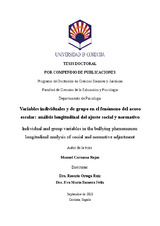Mostrar el registro sencillo del ítem
Variables individuales y de grupo en el fenómeno del acoso escolar: análisis longitudinal del ajuste social y normativo
| dc.contributor.advisor | Ortega Ruiz, Rosario | |
| dc.contributor.advisor | Romera Félix, Eva María | |
| dc.contributor.author | Carmona Rojas, Manuel | |
| dc.date.accessioned | 2023-10-18T09:41:19Z | |
| dc.date.available | 2023-10-18T09:41:19Z | |
| dc.date.issued | 2023 | |
| dc.identifier.uri | http://hdl.handle.net/10396/26042 | |
| dc.description.abstract | La violencia escolar, entendida como el conjunto de comportamientos agresivos que acontecen en el contexto educativo, con una repercusión negativa sobre los escolares, la comunidad educativa y el clima escolar (Del Rey & Ortega-Ruiz, 2003), ha llegado a convertirse en un campo de investigación psicoeducativa predominante en aras de alcanzar resultados que permitan mejorar la convivencia en las escuelas. Uno de los tipos de violencia escolar de mayor repercusión educativa y social la representa el acoso escolar o bullying, en su acepción inglesa. El acoso escolar se presenta como un fenómeno indeseado manifiesto a través de un comportamiento agresivo, inmoral e intencional reiterado en el tiempo que se articula a partir de dos dinámicas integradas en el grupo de iguales: la relación de dominio-sumisión entre agresor y víctima; y la ley del silencio como una conducta evitativa por parte de los espectadores que refuerza la actitud del acosador y su perpetuación (Olweus, 1994; Ortega-Ruiz, 2010). El fenómeno de acoso escolar concurre en episodios de abuso físico, verbal, relacional o psicológico. La investigación psicoeducativa ha permitido gestar modelos sobre el funcionamiento de la dinámica de acoso escolar como un fenómeno grupal que implica la participación de diferentes roles (agresor, víctima y espectadores) cuyas características psicológicas, sociales y emocionales permiten identificar los factores de riesgo que motivan la implicación en acoso escolar y trabajar sobre medidas de protección que puedan paliar el problema y prevenirlo (Ortega & Mora-Merchán, 2008). | es_ES |
| dc.description.abstract | School violence, understood as the set of aggressive behaviours that occur in the educational context with a negative impact on students, the educational community, and the school climate (Del Rey & Ortega-Ruiz, 2003), has become a field of predominant psychoeducational research to achieve results that allow improving school coexistence. One of the types of school violence with the greatest educational and social repercussion is bullying or bullying in its English meaning. Bullying is presented as an unwanted phenomenon manifested through aggressive, immoral, and intentional behaviour repeated over time that is articulated from two dynamics integrated in the peer group: the dominance-submission relationship between aggressor and victim; and the law of silence as an avoidance behaviour on the part of the spectators that reinforces the attitude of the harasser and its perpetuation (Olweus, 1994; Ortega-Ruiz, 2010). The phenomenon of bullying occurs in episodes of physical, verbal, relational or psychological abuse. Psychoeducational research has allowed the development of models on the functioning of the dynamics of bullying as a group phenomenon that implies the participation of different roles (aggressor, victim, and spectators) whose psychological, social, and emotional characteristics allow the identification of the risk factors that motivate bullying. involvement in bullying and work on protection measures that can alleviate the problem and prevent it (Ortega & Mora-Merchán, 2008). | es_ES |
| dc.format.mimetype | application/pdf | es_ES |
| dc.language.iso | spa | es_ES |
| dc.publisher | Universidad de Córdoba, UCOPress | es_ES |
| dc.rights | https://creativecommons.org/licenses/by-nc-nd/4.0/ | es_ES |
| dc.subject | Violencia escolar | es_ES |
| dc.subject | Comunidad educativa | es_ES |
| dc.subject | Acoso escolar | es_ES |
| dc.subject | Bullying | es_ES |
| dc.subject | Agresores | es_ES |
| dc.subject | Víctimas | es_ES |
| dc.title | Variables individuales y de grupo en el fenómeno del acoso escolar: análisis longitudinal del ajuste social y normativo | es_ES |
| dc.title.alternative | Individual and group variables in the bullying phenomenon: longitudinal analysis of social and normative adjustment | es_ES |
| dc.type | info:eu-repo/semantics/doctoralThesis | es_ES |
| dc.relation.projectID | Gobierno de España. FPU1702293 | |
| dc.relation.projectID | Gobierno de España. PSI2016-74871-R | |
| dc.rights.accessRights | info:eu-repo/semantics/openAccess | es_ES |

